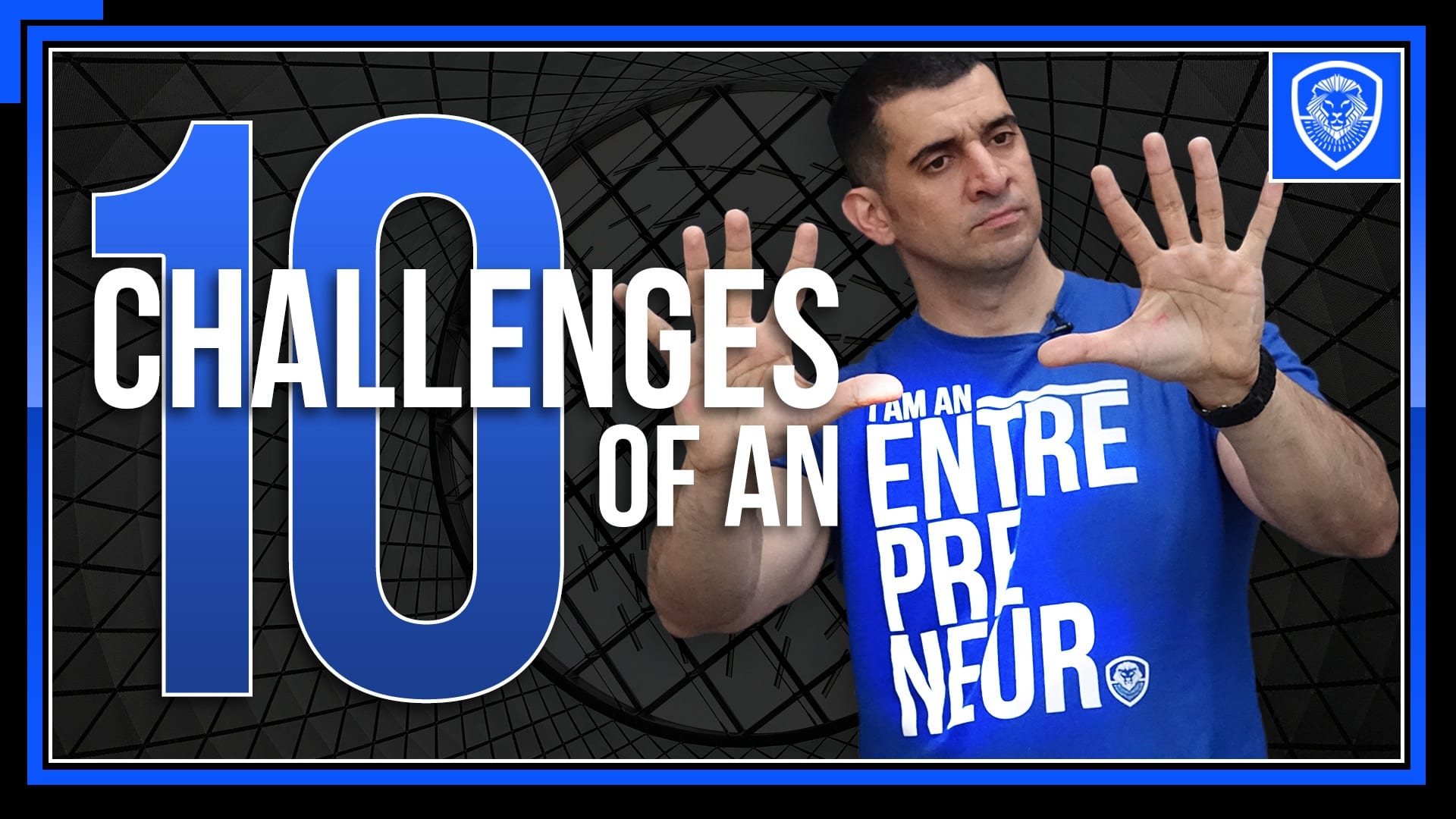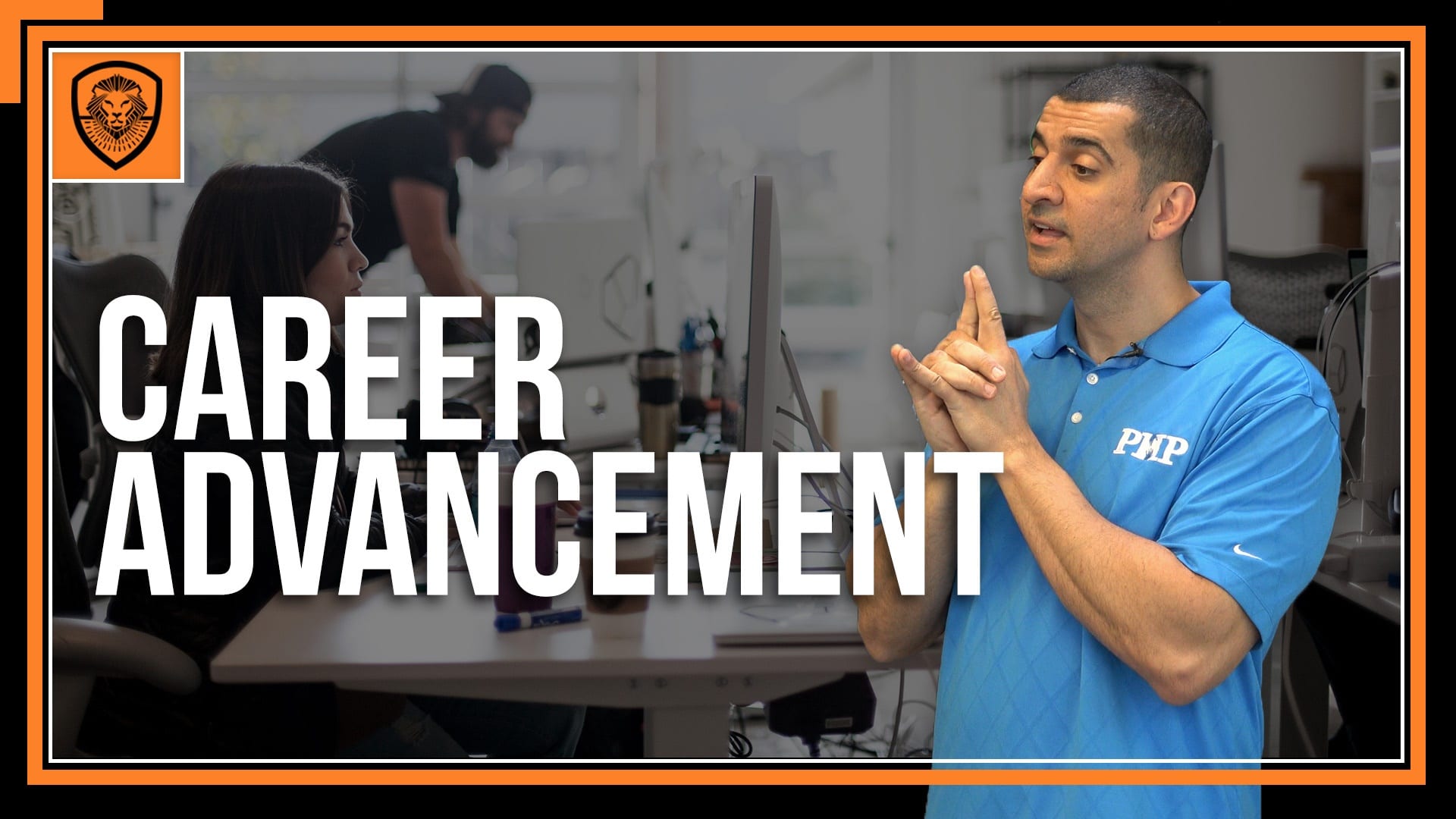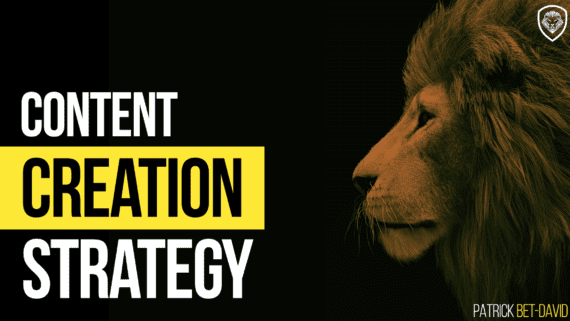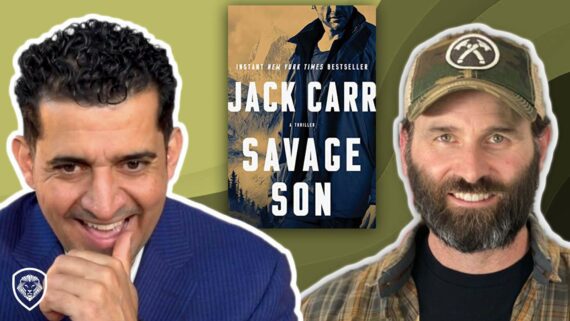In this week’s reading roundup we start and end with the topic of failure, and how owning your failure can actually lead to amazing success.
We also dive into why the military is a great training ground for entrepreneurs, how to tell whether or not you’re a jerk, and the best way to predict your odds of becoming wealthy.
Don’t Be a Hypocrite About Failure
In this article published on Harvard Business Review, writer Justin Brady shares the story of one of his big failures, and how he initially tried to cover it up. I think we can all relate to that. From hiding a broken vase from your mom when you were a little kid, to sharing glowing stories of how amazing your family is doing in the holiday newsletter (in spite of the challenges in your marriage, or kids that aren’t doing well) to not owning up to business failures — we’ve all done it.
[thrive_leads id=’7165′]
Perhaps like me you can relate to these words:
Given how necessary and valuable failure can be, you’d think I would have embraced it as a chance to learn. But, of course, I didn’t. Praising failure in the abstract is one thing. It’s very different when you are the failure.
This article gives the following four reasons for admitting failure:
- If you can’t admit failure, you cannot connect with your team.
- If you can’t admit failure, you won’t learn from it.
- If you can’t admit failure, you won’t tolerate it from others.
- If you can’t admit failure, you’ll find your own future failures tough to handle.
Go here to read the entire article.
To learn about Patrick’s biggest failures his first year of business, check out this related post and video: 12 Mistakes I Made My First Year As An Entrepreneur
Satya Nadella Talks Microsoft at Middle Age
Microsoft has been around for 41 years now, and in this interview on Bloomberg Businessweek, the CEO of Microsoft, Satya Nadella shares what he sees as the most important lessons that he’s learned, and where he sees Microsoft going in the future.
What stood out to me the most are the facts that as entrepreneurs, we need to be aware of what’s happening in the global economy, and the importance of embracing and keeping up with technology in general, and cloud computing in particular. He shared some insights into how cloud computing has children in Indonesia using the exact same programs and tools as his daughter in the U.S.
I appreciated his focus on empowerment, as demonstrated in this quote:
In fact, my goal at Microsoft would be to empower every person and every organization on the planet to achieve more.
He also talked about the importance of learning:
. . . if you take two people, one of them is a learn-it-all and the other one is a know-it-all, the learn-it-all will always trump the know-it-all in the long run, even if they start with less innate capability.
This last quote fits perfectly with one of our videos and articles released here this week on PatrickBetDavid.com:
Don’t Be An A$#Hole
Why The Military Is The Best Entrepreneurship Training Program In America
It’s no surprise that Patrick is a big fan of the military, and the military has impacted my life in tremendous ways as well. While I wasn’t in the military myself, my husband is retired U.S. Army; in the early years of our marriage we lived on Army bases, and both of our children were born in an Army hospital. As I look back on our (almost) 31 years of marriage, we both fondly remember our Army years as some of the best years of our lives.
And indeed, those years, and my husband’s subsequent retirement from the military has done a lot to help us as entrepreneurs, from practical things such as Army retirement pay and health insurance, to lessons that we learned during the time he served.
This article published on Forbes focuses on the following four key lessons learned in the military:
- Set a clear strategic mission and break that mission down into smaller tactical goals.
- Recruit talented people, build esprit de corps, and hold our team accountable for daily progress toward tactical aims.
- Keep mission focus at all times, but allow people to innovate in furtherance of the mission—“adapt and overcome” as the military saying goes.
- Lead from the front, and be prepared to get dirty.
In addition to those lessons learned, if you are have served in the military or are currently serving, once you are discharged, you may be eligible for the G.I. Bill. A friend of mine who is a veteran is currently attending college compliments of the U.S. Army. Not only do they pay for her schooling, they also pay her money to live on, which has freed her up to focus on her education — while she’s also building a photography business.
Those who embrace the lessons learned from serving in the military will go far, and so much the better for those who take advantage of some of the other perks associated with military life.
To receive additional motivation and encouragement as an entrepreneur, check out this related video and article:
12 Military Mottos For Entrepreneurs
https://www.patrickbetdavid.com/military-mottos-for-entrepreneurs/
Are You a Jerk? 10 Questions to Ask Yourself.
I don’t know many, if any people who intentionally set out to be a jerk, but we’ve all encountered our fair share of jerks. And sometimes we’re unaware of, or unwilling to own up to our own “jerkiness.”
In this article published on Entrepreneur, the following 10 questions are posed as ways to evaluate whether or not you’re a jerk:
1. Do you underpay whenever possible?
2. Do you drop names to look good to other entrepreneurs?
3. Are you condescending?
4. Do you tell people how much money you have?
5. Do you consider what’s in it for you before helping someone?
6. Do you blow up before listening to all of the facts?
7. Do you use intimidation to gain the upper hand?
8. Do you see culture as a necessary evil?
9. Do you get personal in an argument?
10. Do you think about what’s legal instead of what’s right?
The one that stood out to me the most was number 10, because it reveals a heart that isn’t interested in how decisions impact others, or the ethics behind them, but instead, on what they can most easily get away with.
To understand the deeper meaning behind each of the questions, be sure to check out the article here.
9 signs you’ll never be rich
Do you want to be rich? If so, you may want to look for these 9 signs in this article on Business Insider that indicate you’re heading in the wrong direction:
1. You put too much emphasis on saving — and not enough on earning
Stop worrying about running out of money and focus on how to make more.
2. You haven’t started investing
The more you can set aside, the better, but even a little bit can go a long way
3. You’re content with a steady paycheck
Average people choose to get paid based on time. . . while rich people choose to get paid based on results.
4. You buy things you can’t afford
Be known for your work ethic, not the trinkets that you buy.
5. You’re pursuing someone else’s dreams — not your own
If you want to be successful, you have to love what you do.
6. You rarely step outside of your comfort zone
. . . the need for comfort can be devastating
7. You don’t have goals for your money
Rich people choose to commit to attaining wealth.
8. You spend first and save what’s left over
If you want to get rich, pay yourself first.
9. You believe getting rich is out of your reach
Just think about #9 for a minute. If you think that you’ll never become rich, chances are, you won’t.
That fits very well with this article published right here, on PatrickBetDavid.com:
If You Want to Gain Financial Freedom, Do This First
https://www.patrickbetdavid.com/gain-financial-freedom/
4 Reasons Entrepreneurs Should Make Traveling a Priority
Do you love to travel, but feel too busy to travel since you’ve become an entrepreneur? Or do you have the time, but don’t want to spend the money? If so, check out this post published on Addicted2Success that gives the following four reasons entrepreneurs should make traveling a priority.
1. It will teach you how to be flexible and take risks
2. You open your mind to more possibilities
3. Build connections with people who are not like you
4. You will increase your awareness of global challenges
My husband, our two children and I had the privilege of spending a year in India, where we worked as cultural researchers. As challenging as that was, it was probably one of the best, if not the best things that we did for our children as they were growing up. It had an impact on Mom and Dad, too.
While you may not have the opportunity to live overseas, traveling internationally whenever possible will stretch you and open your eyes in ways that nothing else will.
When you’re “not in Kansas anymore,” you learn that the rest of the world operates in a way that may be complete foreign to you, but that doesn’t make it wrong.
For instance, I recall people dropping by our home in India, uninvited, and staying for a couple of hours. In that culture, it would have been rude to turn them away, so instead, I served them chai and biscuits and chatted with them, for an hour, two or more, until they decided to leave. At times that was rather awkward since my Hindi wasn’t the best, and at times they didn’t speak any English. As a super organized person, I found the interruption to my day annoying; I had to learn how to relax, and not get upset when people threw off my plans for the day.
And as point number three above mentions, I had to learn how to connect with people who didn’t think, look, talk, or act like me, and I’m a better person, and better entrepreneur now, since I learned how to interact with people from a different culture.
How To Turn Your Most Embarrassing Failure Into Good Fortune
Close your eyes for a minute and think of your most embarrassing failure? What happened as a result? Did you profit in some way because of it, or did that failure cause you to quit?
In this article published on Inc.com, a story is told about a failure that happened in front of millions of people on live T.V., and how that failure resulted in success. I’ll let you read the story yourself here, and leave you with this quote to ponder:
. . . when you fail, you get back up, own your mistake and keep trying. You show back up for work the next day and try again.
Do you need to get back up today?
The Mental Battle of an Entrepreneur
If you feel embarrassed by your failures. . . If you feel discouraged and like this entrepreneurship thing will never work for you, and like you just don’t have what it takes to succeed, I want to leave you with a video that Patrick published this week that deals with the voices we hear as entrepreneurs, and the importance of listening to the right voice.
This video is beautifully done, and has made a huge impact on many people, myself included.
The video has taken social media by storm:
-Over 15,000 likes
-Over 8,000 shares
-Over 380,000 views so far
Here’s just a small sampling of what viewers are saying:
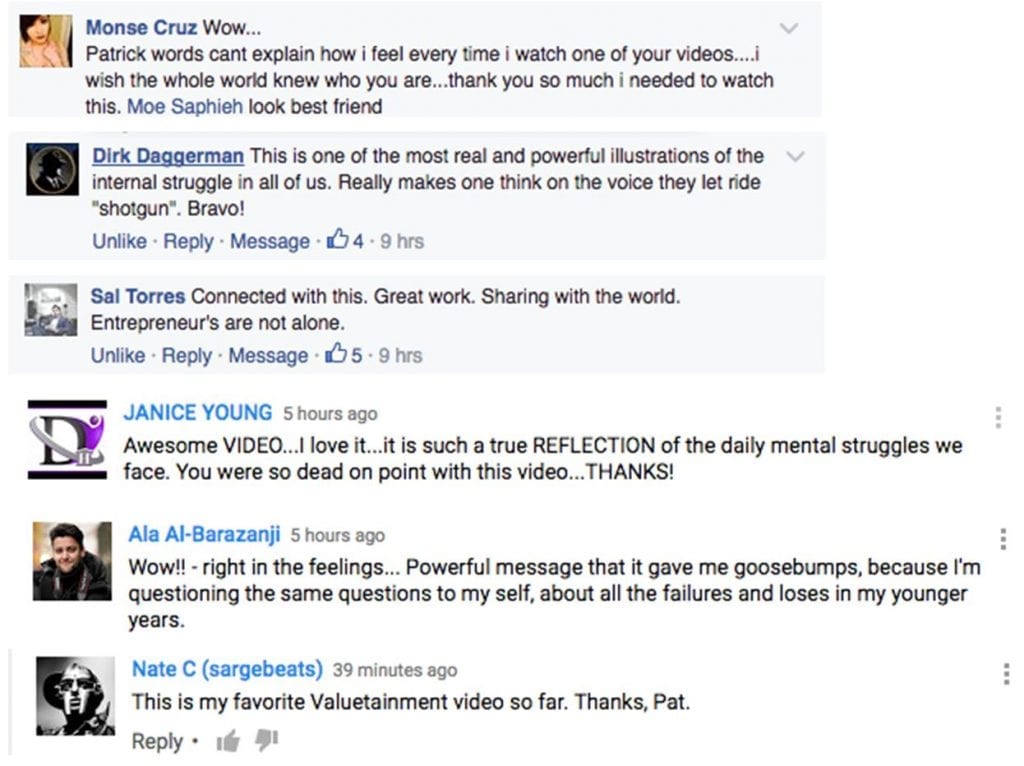
If you haven’t watched it yet, please do; I can guarantee you’ll be glad you did. Go here to check it out.
And if you haven’t already subscribed to the Valuetainment YouTube channel, click on the button below to subscribe.
[button content=”Subscribe to my YouTube channel” color=”red” text=”white” url=”http://www.youtube.com/subscription_center?add_user=patrickbetdavid” openin=”_blank”]


